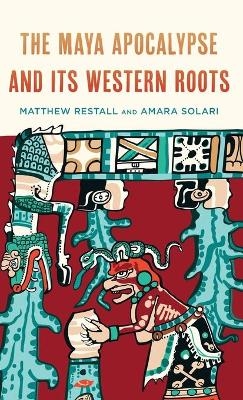
The Maya Apocalypse and Its Western Roots
Seiten
2021
Rowman & Littlefield (Verlag)
978-1-5381-5497-7 (ISBN)
Rowman & Littlefield (Verlag)
978-1-5381-5497-7 (ISBN)
Driven by a clear and compelling argument, this engaging book traces apocalyptic thinking in two civilizations—Western and Maya. Looking both back and forward, Matthew Restall and Amara Solari build on their previous study, 2012 and the End of the World, to explore the persistence of our civilization’s end-of-times anxiety and anticipation.
This fascinating history explores the cultural roots of our civilization’s obsession with the end of the world. Busting the myth of the ancient Maya prediction that time would end in 2012, Matthew Restall and Amara Solari build on their previous book, 2012 and the End of the World, to use the Maya case to connect such seemingly disparate historical events as medieval European millenarianism, Moctezuma’s welcome to Cortés, Franciscan missionizing in Mexico, prophetic traditions in Yucatan, and the growing belief today in conspiracies and apocalypses. In demystifying the 2012 phenomenon, the authors draw on their decades of scholarship to provide an accessible and engaging explanation of what Mayas and Aztecs really believed, how Judeo-Christian apocalypticism became part of the Indigenous Mesoamerican and modern American worlds, and why millions continue to anticipate an imminent Doomsday.
This fascinating history explores the cultural roots of our civilization’s obsession with the end of the world. Busting the myth of the ancient Maya prediction that time would end in 2012, Matthew Restall and Amara Solari build on their previous book, 2012 and the End of the World, to use the Maya case to connect such seemingly disparate historical events as medieval European millenarianism, Moctezuma’s welcome to Cortés, Franciscan missionizing in Mexico, prophetic traditions in Yucatan, and the growing belief today in conspiracies and apocalypses. In demystifying the 2012 phenomenon, the authors draw on their decades of scholarship to provide an accessible and engaging explanation of what Mayas and Aztecs really believed, how Judeo-Christian apocalypticism became part of the Indigenous Mesoamerican and modern American worlds, and why millions continue to anticipate an imminent Doomsday.
Matthew Restall and Amara Solari are specialists in Maya culture and in colonial Mexican history and art history. Both teach at the Pennsylvania State University, where Restall is a Sparks Professor in history and anthropology, and Solari is professor of art history and anthropology. His books include Maya Conquistador, Seven Myths of the Spanish Conquest, and When Montezuma Met Cortés. Her books include Maya Ideologies of the Sacred and Idolizing Mary. They recently coauthored The Maya: A Very Short Introduction.
| Erscheinungsdatum | 05.07.2021 |
|---|---|
| Verlagsort | Lanham, MD |
| Sprache | englisch |
| Maße | 149 x 227 mm |
| Gewicht | 327 g |
| Themenwelt | Geschichte ► Allgemeine Geschichte ► Altertum / Antike |
| Geisteswissenschaften ► Geschichte ► Regional- / Ländergeschichte | |
| Geisteswissenschaften ► Religion / Theologie ► Weitere Religionen | |
| ISBN-10 | 1-5381-5497-8 / 1538154978 |
| ISBN-13 | 978-1-5381-5497-7 / 9781538154977 |
| Zustand | Neuware |
| Haben Sie eine Frage zum Produkt? |
Mehr entdecken
aus dem Bereich
aus dem Bereich
die Inszenierung der Politik in der römischen Republik
Buch | Hardcover (2023)
C.H.Beck (Verlag)
48,00 €
Buch | Hardcover (2024)
Klett-Cotta (Verlag)
50,00 €


